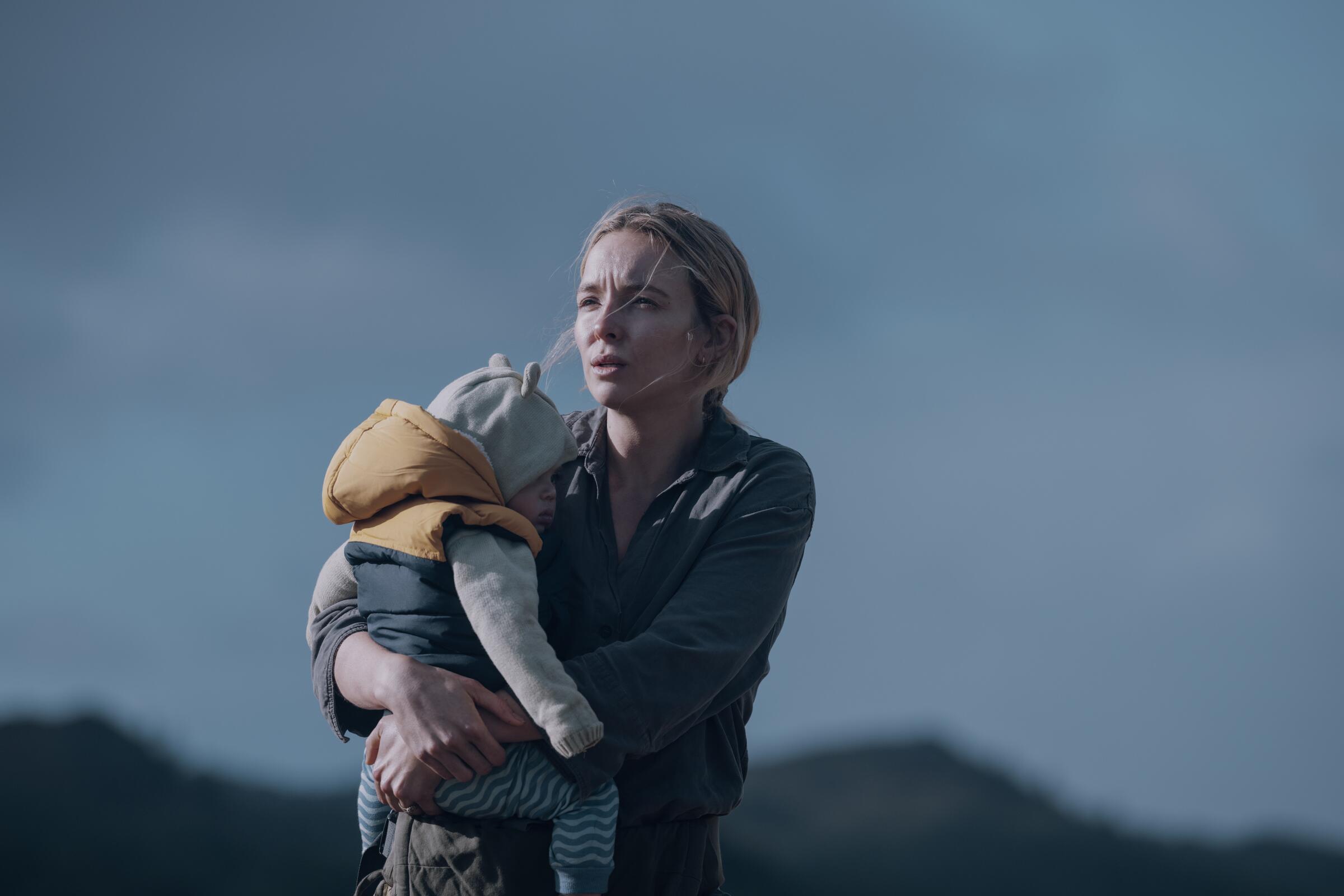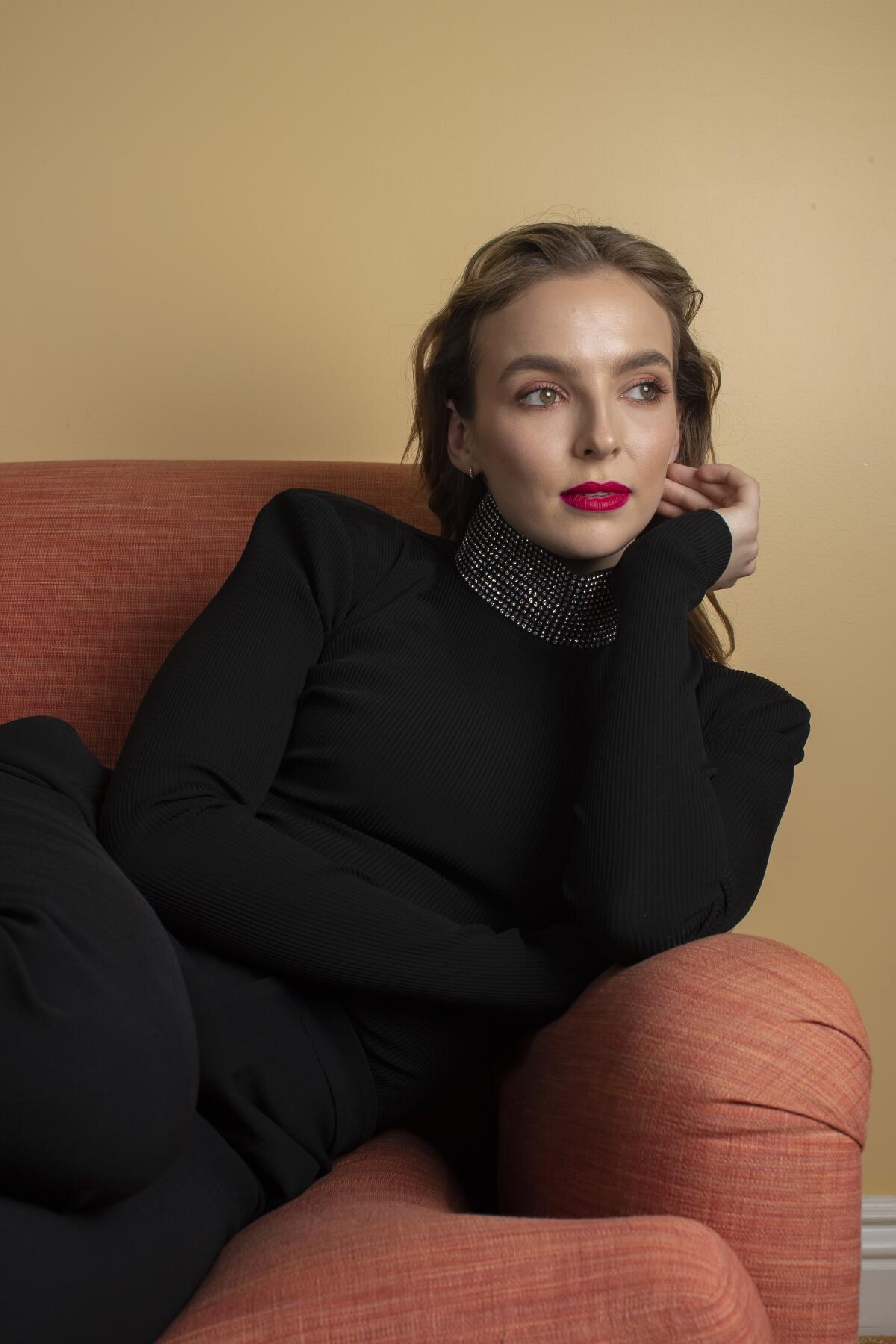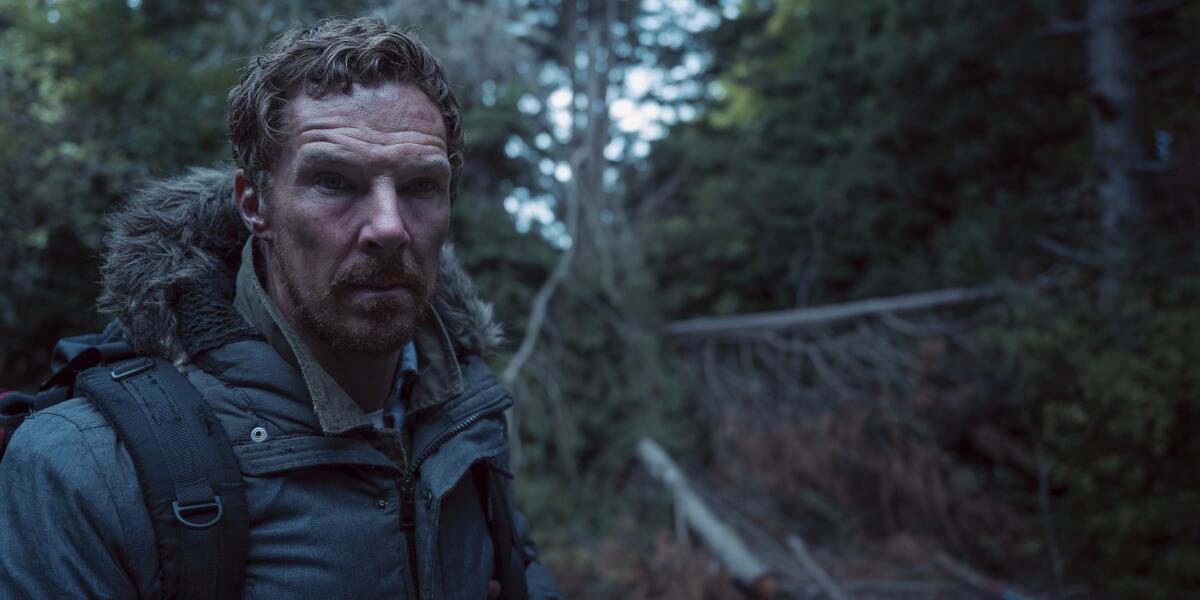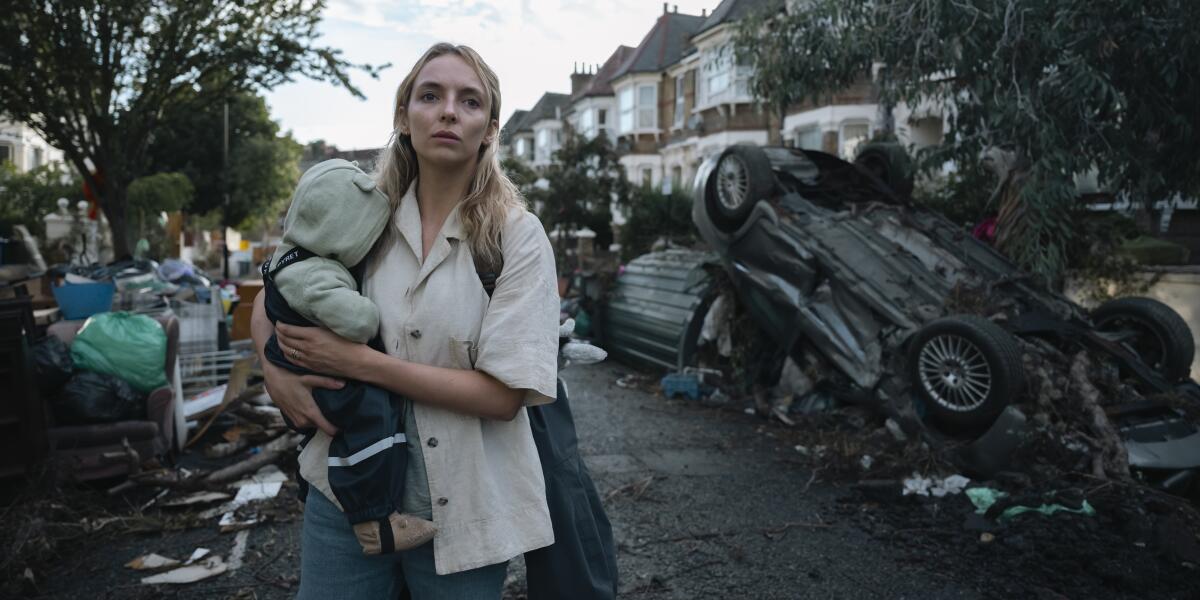Newsletter
Only good movies
Get the Indie Focus newsletter, Mark Olsen's weekly guide to the world of cinema.
You may occasionally receive promotional content from the Los Angeles Times.

Jodie Comer knows people recognize her as Villanelle, the psychopathic assassin she played on “Killing Eve” for four seasons. The character was audacious and unhinged, requiring an equally bold performance. But the Liverpudlian actor, 30, has always felt more at home in subtler roles. It’s what she did before “Killing Eve” and it’s why she signed on to star in “The End We Start From” (now in limited release), a lyrical, small-scale interpretation of Megan Hunter’s 2017 post-apocalyptic novel about a woman who gives birth as a natural disaster unfolds.
“It’s funny that Villanelle is what people recognize me for,” Comer says, curled in a chair in London’s Corinthia Hotel. “But I love anything that holds a mirror up or feels real. I mean, there’s an arena for everything, right? Everything has a purpose.”
Her new film is a pivot back to something more “contained,” she says. “I could sense it was [going to be] naturalistic and stripped back and raw. That can be really exposing as an actor, but ultimately very exciting.”
“The End We Start From,” directed by Mahalia Belo, imagines a near future where an ecological crisis literally floods Britain. A woman, known only as Mother, gives birth for the first time just as the waters are rising, sending her and her partner, R (Joel Fry), fleeing London for higher ground. The country descends into chaos, forcing Mother to not only survive but protect her young son in an uncertain world.
“Climate crisis is a huge element of the film and there’s no doubt that’s a very real problem we’re facing,” Comer says. “But I also loved how artistically Mahalia was viewing it as a symbol of the birth itself. There was something so poetic about her exploration of the story.”

Belo doesn’t see it as a disaster film. Mother is up against real struggle (as is Mother Earth), but “The End We Start From” never descends into overt violence. Instead, Belo says, “the biggest thing the character has to get through is her own experience” of surviving the chaos of a societal collapse with a young baby.
Benedict Cumberbatch’s production company Sunnymarch acquired the rights to “The End We Start From” pre-publication, due in part to the fact that original novelist Hunter is the actor’s sister-in-law. Her prose is sparse and fragmented, told in verse-like glimpses. Not only did Cumberbatch feel it read cinematically, but the female-led story also reflected the vision of Sunnymarch.
“It’s such a powerful, polemic piece, as well as being poetic and also mundane at times,” Cumberbatch says, speaking via Zoom from London. “It’s so honest and raw about early motherhood. The foreground focus of a mother and child in that first year against this epic backdrop of societal and systemic collapse is a very rich mental canvas to draw from.”
Cumberbatch, who plays a small role in the film, adds that the story felt eerily current. It’s not a coincidence, he says, that he’s speaking about it after two weeks of heavy rain catastrophically flooded parts of England.
“But it doesn’t have to be after a deluge of water to imagine this as a reality,” Cumberbatch says. “It is already a reality for people. People are giving birth in crises around the world, whether it’s war or environmental disaster. What’s stark about it is it’s bringing it into a domesticity that’s recognizably British.”

Director Belo read Alice Birch’s screenplay during the initial COVID lockdown, shortly after giving birth to her second child. The story spoke to her experience of “trying to be there for someone else when you’re worried.”
“You’re looking at this world changing around you and you’re wondering what kind of world this baby’s going to be entering into,” Belo remembers. “The journey that this one woman goes on while dealing with the process of being a new mum was really interesting. I thought it deserved a space on screen.”
Comer was cast as Mother on the cusp of making her West End debut in Suzie Miller’s one-woman play “Prima Facie.” The biggest hurdle, Comer says, was that she had not experienced motherhood herself. But she was curious. Belo connected the actor with a midwife and gave her a weighted baby doll to hold while she did daily activities. The pair also continuously traded videos and poems.
“I was very fortunate that my best friend had had a baby before we started, so I asked her the real nitty-gritty questions,” Comer says. “But ultimately my lack of knowledge was perfect because Woman also has that at the start.”
The film was shot over 30 days in and around London, on a tight schedule with little room to maneuver because the babies could only be on set for 20 minutes at a time. In total, 15 different babies were used for the story, which follows Mother as she is separated from R and searches for safety with O (Katherine Waterston), a fellow mom.
“Babies don’t take notes,” Comer says, thoughtfully. “They’re incredibly honest. They just observe and they react and you’re at the mercy of it so you have to roll with it. I think it creates a real spontaneity on set. There are moments within the film that happened as a result of that, so actually I think it was a blessing in many ways.”
One of these moments came during an emotionally hefty scene between Comer and Fry as the characters deal with a tragic loss. Both actors felt the weight of the grief, but then the baby, laying between them on a bed, smiled, adding a new layer to the emotion. “It’s this moment of joy that Woman notices and reacts to and feels,” Comer says. “It almost steals her away from being there for him.”

Still, the constraints of making an independent film were challenging. Comer caught COVID-19 during production and an emotional scene between her and Fry had to be shot separately due to the schedule. Later, when the filming moved to Scotland for five days, time ran out before a pivotal sequence of Mother walking into the sea could be shot. Comer insisted they get one take and waded into the freezing cold water with cinematographer Suzie Lavelle. The evocative scene, a turning point for the character, is essential to the final film.
“It was really important to me,” Comer says. “This is the first time I’ve been this heavily involved in making an independent film. There’s no guarantee of what the outcome is going to be, but it’s people telling stories that are very they feel are important and as a result of that there’s such a care that goes into them. I really felt that on this.”
At the same time, Comer, who executive produced the film, was preparing to play Kathy Bauer in Jeff Nichols’ “The Bikeriders.” Off set, Comer practiced her Midwestern accent for the film, which she shot in Cincinnati only a week after wrapping “The End We Start From.” She admits it was “not an ideal way to work,” but she just loves acting. She’s full of questions and uses her characters as ways of searching for answers.
“I’m always looking for something different, a part of myself that I maybe haven’t worked out or a challenge that feels new,” Comer says. “Just so I can continue growing, you know? I don’t want to get in a repeated cycle of, ‘Oh, I’m safe here so this is where I’m going to stay.’ I think it’s important to feel a little bit scared about what you’re taking on.”
We’ve mapped out 27 of the best movie theaters in L.A., from the TCL Chinese and the New Beverly to the Alamo Drafthouse and which AMC reigns in Burbank.
“The End We Start From” is Comer’s first time leading a film. She co-starred in Ridley Scott’s “The Last Duel” and played a love interest in Shawn Levy’s “Free Guy,” but here she’s in nearly every scene, the camera drawn in close. She talks about movie stars with admiration, laughing when asked if she sees herself as one. “No,” she says, “not like a movie star.”
Going forward, Comer hopes to do more films, more theater and maybe a limited series. She’s “content” with the amount of time she spent as Villanelle — that chapter is now over. She’s also aware of the reaction to the finale of “Killing Eve,” which sent Villanelle to her death in a way that enraged fans. But for Comer, it’s about the journey, not the response.
It’s about integrity, she says, when thinking about whether to take on a role. “[If I know] why I’m stepping into it and know what I gain from the experience, then if it goes out into the world and people hate it or it completely goes unnoticed or it’s a huge success, it doesn’t matter,” she says. “That doesn’t change my experience and how I felt.”
What she gained from the experience of “The End We Start From” seems immeasurable.
“I never necessarily felt maternal,” Comer says. “I hadn’t really discovered that part of myself. And then when I started filming and doing the research and through the process, I was like, ‘Oh, actually, I think that is within me if it’s something I choose.’ I have such an appreciation of women and how selfless an act that is to have a child.”
Like Mother’s journey in “The End We Start From,” Comer’s trajectory has been unexpected, often bringing her to places she never imagined. And now she’s here, on the cusp of being one of those movie stars she talks so longingly about.
Only good movies
Get the Indie Focus newsletter, Mark Olsen's weekly guide to the world of cinema.
You may occasionally receive promotional content from the Los Angeles Times.